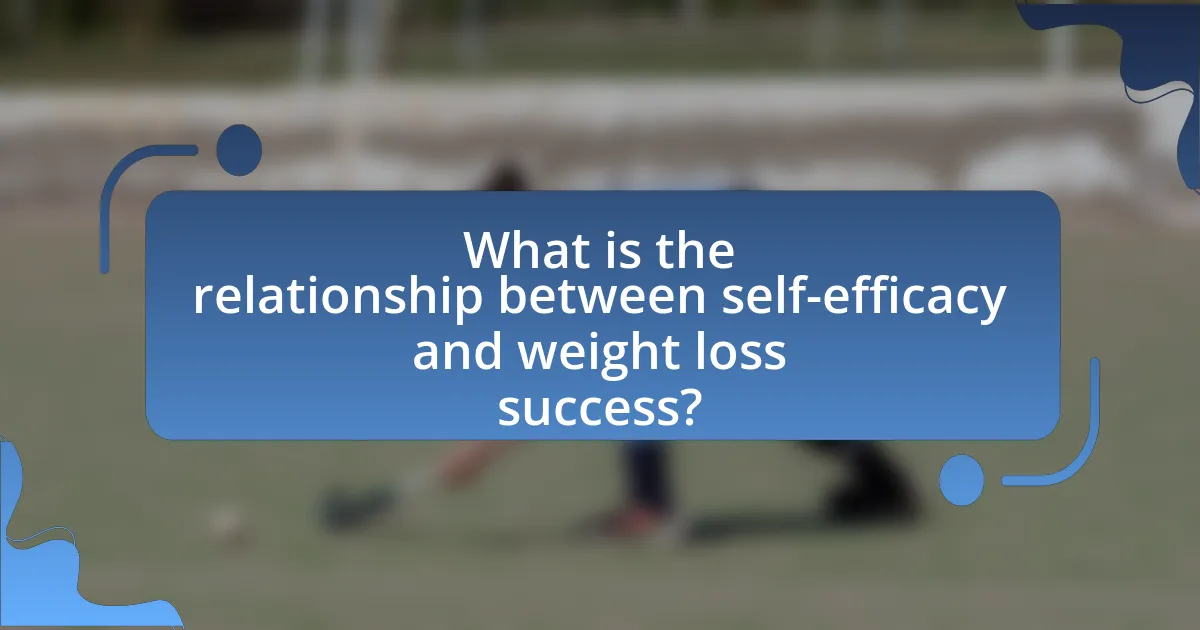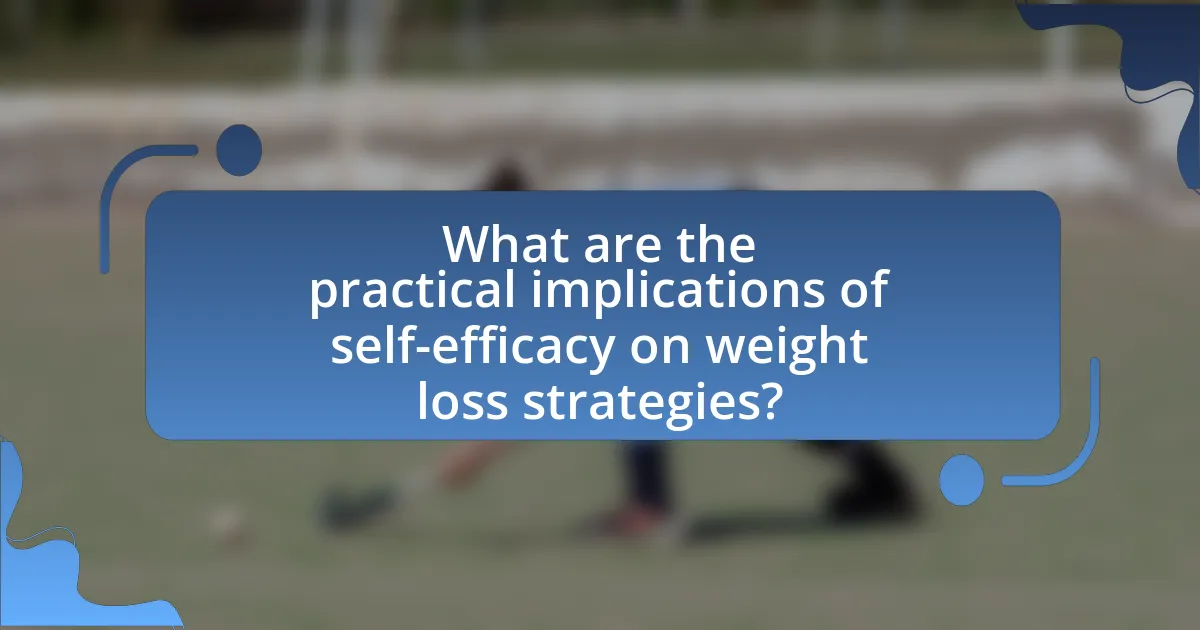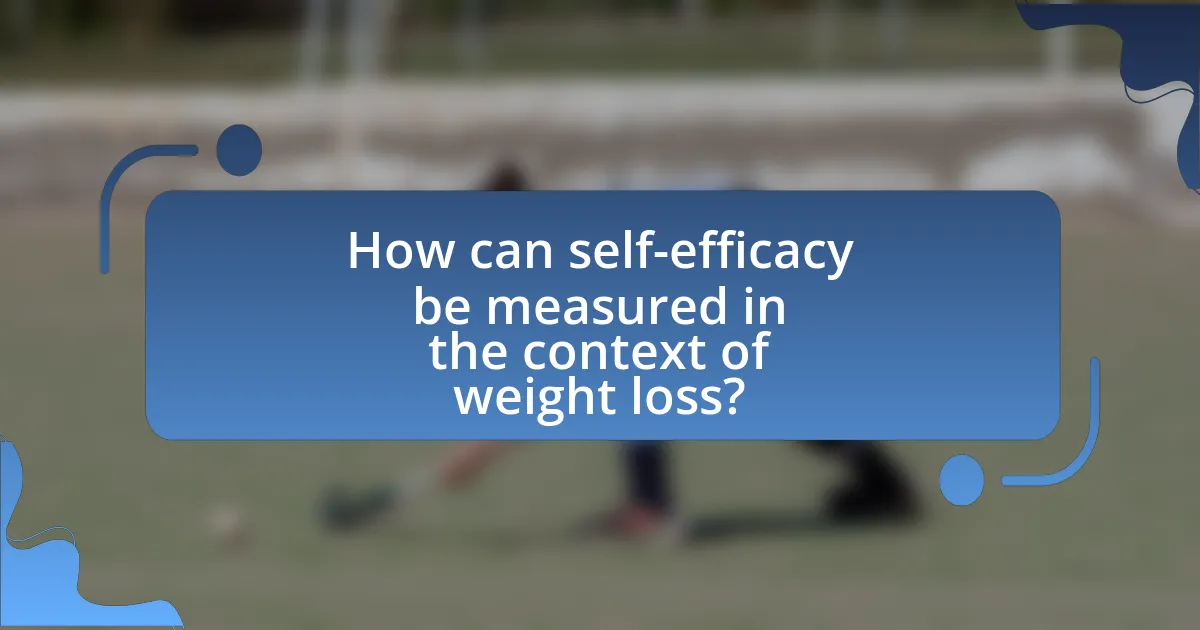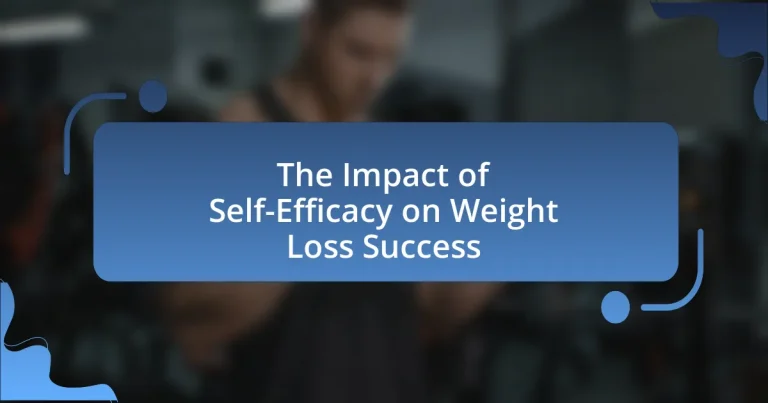The article examines the significant relationship between self-efficacy and weight loss success, highlighting how individuals with higher self-efficacy are more likely to set and achieve their weight loss goals. It discusses the psychological mechanisms through which self-efficacy influences motivation, goal-setting, and resilience, as well as the impact of social support and environment on self-efficacy levels. Additionally, the article reviews research findings that demonstrate the correlation between self-efficacy assessments and actual weight loss outcomes, while also addressing common challenges faced in building self-efficacy and strategies to overcome these barriers. Ultimately, it emphasizes the importance of fostering self-efficacy as a critical factor in achieving and maintaining successful weight loss.

What is the relationship between self-efficacy and weight loss success?
Self-efficacy significantly influences weight loss success, as individuals with higher self-efficacy are more likely to set and achieve weight loss goals. Research indicates that self-efficacy affects motivation, persistence, and the ability to overcome obstacles during weight loss efforts. For instance, a study published in the journal “Health Psychology” by Bandura (1997) found that individuals with strong self-efficacy beliefs are more likely to engage in healthy behaviors, adhere to diet plans, and maintain exercise routines, leading to greater weight loss outcomes. Thus, enhancing self-efficacy can be a crucial factor in achieving and sustaining weight loss success.
How does self-efficacy influence an individual’s motivation to lose weight?
Self-efficacy significantly influences an individual’s motivation to lose weight by enhancing their belief in their ability to achieve weight loss goals. When individuals possess high self-efficacy, they are more likely to set challenging goals, persist in the face of obstacles, and engage in healthy behaviors such as regular exercise and balanced eating. Research indicates that individuals with strong self-efficacy are more likely to adhere to weight loss programs and experience greater weight loss success. For instance, a study published in the journal “Health Psychology” found that self-efficacy was a strong predictor of weight loss outcomes, with participants demonstrating higher self-efficacy achieving greater weight loss compared to those with lower self-efficacy levels.
What psychological mechanisms are involved in self-efficacy and weight loss?
Self-efficacy significantly influences weight loss through mechanisms such as goal setting, self-regulation, and resilience. Individuals with high self-efficacy are more likely to set achievable weight loss goals, which enhances their motivation and commitment to follow through with dietary and exercise plans. Research indicates that self-efficacy is linked to better self-regulation, allowing individuals to monitor their progress and adjust their behaviors accordingly. Furthermore, high self-efficacy fosters resilience, enabling individuals to overcome setbacks and maintain their weight loss efforts. Studies, such as those by Bandura (1997), demonstrate that self-efficacy is a strong predictor of behavioral change, highlighting its critical role in successful weight management.
How does self-efficacy affect goal-setting in weight loss journeys?
Self-efficacy significantly influences goal-setting in weight loss journeys by enhancing individuals’ belief in their ability to achieve specific weight loss targets. When individuals possess high self-efficacy, they are more likely to set challenging and realistic goals, which can lead to greater commitment and persistence in their weight loss efforts. Research indicates that individuals with higher self-efficacy are more likely to engage in healthy behaviors, such as regular exercise and balanced nutrition, which are essential for successful weight loss. A study published in the Journal of Health Psychology found that self-efficacy is a strong predictor of goal-setting and achievement in weight management, demonstrating that those who believe in their capabilities are more successful in reaching their weight loss goals.
Why is self-efficacy considered a critical factor in weight loss?
Self-efficacy is considered a critical factor in weight loss because it influences an individual’s belief in their ability to successfully engage in behaviors necessary for weight management. High self-efficacy leads to greater motivation, persistence, and resilience in the face of challenges, which are essential for adhering to diet and exercise plans. Research indicates that individuals with higher self-efficacy are more likely to set realistic goals, employ effective strategies, and maintain long-term lifestyle changes, ultimately resulting in more successful weight loss outcomes. For instance, a study published in the journal “Health Psychology” found that self-efficacy significantly predicted weight loss success among participants in a behavioral weight loss program, highlighting its importance in achieving and sustaining weight loss.
What research supports the link between self-efficacy and weight loss outcomes?
Research consistently demonstrates a strong link between self-efficacy and weight loss outcomes. For instance, a study by Bandura (1997) highlights that individuals with higher self-efficacy are more likely to engage in health-promoting behaviors, leading to successful weight loss. Additionally, a meta-analysis by McAuley and Rudolph (1995) found that self-efficacy significantly predicts exercise adherence, which is crucial for weight management. Furthermore, a study published in the Journal of Consulting and Clinical Psychology by McAuley et al. (2000) indicated that self-efficacy is a key determinant of weight loss success, as it influences individuals’ motivation and persistence in following dietary and exercise regimens. These findings collectively underscore the importance of self-efficacy in achieving and maintaining weight loss.
How do self-efficacy levels vary among individuals attempting to lose weight?
Self-efficacy levels among individuals attempting to lose weight vary significantly, influencing their motivation and persistence in weight loss efforts. Research indicates that individuals with high self-efficacy are more likely to set challenging weight loss goals, adhere to dietary plans, and engage in regular physical activity. For instance, a study published in the Journal of Health Psychology found that participants with higher self-efficacy reported greater weight loss success and were more resilient in overcoming obstacles. Conversely, those with low self-efficacy often experience self-doubt, leading to decreased motivation and higher rates of relapse. This variation in self-efficacy is crucial, as it directly correlates with the effectiveness of weight loss interventions and overall success in achieving weight management goals.

What are the practical implications of self-efficacy on weight loss strategies?
Self-efficacy significantly influences weight loss strategies by enhancing individuals’ belief in their ability to achieve weight loss goals. Higher self-efficacy leads to increased motivation, persistence in following diet and exercise plans, and a greater likelihood of overcoming obstacles. Research indicates that individuals with strong self-efficacy are more likely to engage in healthy behaviors, such as regular physical activity and adhering to nutritional guidelines, which are critical for successful weight loss. For instance, a study published in the “Journal of Health Psychology” by Bandura (1997) demonstrated that self-efficacy is a strong predictor of health-related behaviors, including weight management. Thus, fostering self-efficacy can be a practical approach in designing effective weight loss interventions.
How can individuals enhance their self-efficacy for better weight loss results?
Individuals can enhance their self-efficacy for better weight loss results by setting specific, achievable goals and tracking their progress. Research indicates that goal-setting increases motivation and self-belief, which are critical components of self-efficacy. For instance, a study published in the Journal of Health Psychology found that participants who set specific weight loss goals were more likely to achieve their targets compared to those with vague objectives. Additionally, engaging in self-monitoring, such as keeping a food diary or using fitness apps, reinforces a sense of control and accomplishment, further boosting self-efficacy.
What specific techniques can boost self-efficacy in weight loss efforts?
Specific techniques that can boost self-efficacy in weight loss efforts include goal setting, self-monitoring, and social support. Goal setting involves establishing clear, achievable objectives, which has been shown to enhance motivation and commitment; research indicates that individuals who set specific goals are more likely to succeed in weight loss (Locke & Latham, 2002). Self-monitoring, such as keeping a food diary or using apps to track progress, allows individuals to observe their behaviors and outcomes, reinforcing their ability to manage their weight effectively. Additionally, social support from friends, family, or support groups provides encouragement and accountability, which has been linked to increased self-efficacy and better weight loss outcomes (Wing & Jeffery, 1999).
How do social support and environment impact self-efficacy in weight loss?
Social support and environment significantly enhance self-efficacy in weight loss by providing encouragement and resources that foster belief in one’s ability to succeed. Research indicates that individuals with strong social support networks, such as family and friends, are more likely to engage in healthy behaviors and persist in their weight loss efforts. For instance, a study published in the journal “Health Psychology” by Wing and Jeffery (1999) found that participants who received social support reported higher self-efficacy and greater weight loss success compared to those without such support. Additionally, a supportive environment, including access to healthy foods and safe spaces for physical activity, further reinforces self-efficacy by making healthy choices more attainable. This combination of social and environmental factors creates a conducive atmosphere for individuals to believe in their capacity to achieve weight loss goals.
What role does self-efficacy play in maintaining weight loss over time?
Self-efficacy significantly influences the maintenance of weight loss over time by enhancing individuals’ belief in their ability to sustain healthy behaviors. Research indicates that higher self-efficacy is associated with better adherence to dietary and exercise regimens, which are crucial for long-term weight management. For instance, a study published in the journal “Health Psychology” found that individuals with strong self-efficacy were more likely to engage in regular physical activity and maintain their weight loss compared to those with lower self-efficacy levels. This correlation underscores the importance of fostering self-efficacy to support sustained weight loss efforts.
How does self-efficacy influence long-term adherence to weight loss plans?
Self-efficacy significantly influences long-term adherence to weight loss plans by enhancing individuals’ belief in their ability to achieve and maintain weight loss goals. Research indicates that higher self-efficacy is associated with increased motivation, persistence, and resilience in the face of challenges, which are critical for sustaining lifestyle changes. For instance, a study published in the Journal of Health Psychology found that individuals with high self-efficacy were more likely to adhere to dietary and exercise regimens over six months compared to those with lower self-efficacy. This correlation underscores the importance of fostering self-efficacy to improve long-term weight loss outcomes.
What strategies can help sustain self-efficacy after achieving weight loss goals?
To sustain self-efficacy after achieving weight loss goals, individuals should engage in regular self-monitoring, set new achievable goals, and maintain social support networks. Regular self-monitoring, such as tracking food intake and physical activity, reinforces positive behaviors and helps individuals stay accountable. Setting new achievable goals, like maintaining weight or improving fitness levels, provides ongoing motivation and a sense of accomplishment. Additionally, maintaining social support networks, whether through friends, family, or support groups, fosters encouragement and accountability, which are crucial for long-term success. Research indicates that individuals who utilize these strategies are more likely to sustain their weight loss and maintain high self-efficacy levels over time.

How can self-efficacy be measured in the context of weight loss?
Self-efficacy in the context of weight loss can be measured using validated self-report questionnaires, such as the Weight Efficacy Lifestyle Questionnaire (WEL) and the Self-Efficacy for Exercise Scale (SEE). These tools assess an individual’s confidence in their ability to perform behaviors necessary for weight loss, such as dietary control and physical activity. Research indicates that higher self-efficacy scores correlate with greater weight loss success, as demonstrated in a study by Bandura (1997), which established the link between self-efficacy and behavioral change in health contexts.
What tools and assessments are available to evaluate self-efficacy in weight loss?
Tools and assessments available to evaluate self-efficacy in weight loss include the Self-Efficacy for Exercise Scale (SEE), the Weight Efficacy Lifestyle Questionnaire (WEL), and the General Self-Efficacy Scale (GSES). The Self-Efficacy for Exercise Scale measures confidence in one’s ability to engage in physical activity, while the Weight Efficacy Lifestyle Questionnaire assesses confidence in managing weight-related behaviors. The General Self-Efficacy Scale evaluates overall self-efficacy across various domains, including weight loss. Research indicates that higher self-efficacy is correlated with greater weight loss success, as demonstrated in studies published in journals such as the Journal of Behavioral Medicine, which highlight the predictive value of self-efficacy in weight management outcomes.
How do self-efficacy assessments correlate with actual weight loss success?
Self-efficacy assessments positively correlate with actual weight loss success, as individuals with higher self-efficacy are more likely to set and achieve weight loss goals. Research indicates that self-efficacy influences motivation, persistence, and the ability to overcome obstacles, which are critical factors in weight management. A study published in the Journal of Behavioral Medicine found that participants with elevated self-efficacy reported greater weight loss and adherence to dietary and exercise regimens over a six-month period. This evidence supports the notion that self-efficacy is a significant predictor of successful weight loss outcomes.
What are the limitations of measuring self-efficacy in weight loss studies?
Measuring self-efficacy in weight loss studies has several limitations, primarily related to the subjective nature of self-reported data. Self-efficacy assessments often rely on individuals’ perceptions of their abilities, which can be influenced by mood, social desirability, and situational factors, leading to inconsistent and biased results. Additionally, self-efficacy is a dynamic construct that may change over time, making it challenging to capture its true impact on weight loss consistently. Research indicates that self-efficacy can fluctuate based on immediate experiences and outcomes, complicating longitudinal studies that aim to correlate self-efficacy with sustained weight loss. Furthermore, existing measurement tools may not adequately account for the multifaceted nature of self-efficacy, potentially overlooking critical dimensions such as context-specific confidence and coping strategies. These limitations highlight the need for more robust and comprehensive methods to assess self-efficacy in weight loss research.
What are common challenges faced in building self-efficacy for weight loss?
Common challenges faced in building self-efficacy for weight loss include negative self-perception, lack of social support, and previous unsuccessful attempts at weight loss. Negative self-perception can lead to feelings of inadequacy, which undermine confidence in one’s ability to lose weight. Research indicates that individuals with a history of failed weight loss attempts often experience diminished self-efficacy, making it harder to commit to new weight loss strategies. Additionally, a lack of social support can hinder motivation and accountability, as studies show that social networks significantly influence weight loss success. These challenges collectively create barriers that individuals must overcome to enhance their self-efficacy and achieve weight loss goals.
How can setbacks and failures impact self-efficacy during weight loss?
Setbacks and failures can significantly diminish self-efficacy during weight loss by creating feelings of inadequacy and discouragement. When individuals experience challenges, such as weight plateaus or lapses in diet adherence, their belief in their ability to succeed can weaken. Research indicates that self-efficacy is closely linked to motivation and persistence; for instance, a study published in the Journal of Health Psychology found that individuals with lower self-efficacy are more likely to give up on weight loss efforts after encountering obstacles. This decline in self-efficacy can lead to a cycle of negative thinking, further exacerbating the challenges faced in achieving weight loss goals.
What strategies can help overcome barriers to self-efficacy in weight loss?
To overcome barriers to self-efficacy in weight loss, individuals can employ strategies such as setting specific, achievable goals, utilizing social support, and engaging in self-monitoring. Setting specific, achievable goals helps individuals create a clear roadmap for their weight loss journey, which has been shown to enhance motivation and commitment. Research indicates that social support from friends, family, or support groups can significantly boost self-efficacy by providing encouragement and accountability. Additionally, self-monitoring through tools like food diaries or fitness apps allows individuals to track their progress, reinforcing a sense of control and accomplishment. These strategies collectively contribute to improved self-efficacy, which is crucial for sustained weight loss success.
What are the best practices for leveraging self-efficacy in weight loss programs?
The best practices for leveraging self-efficacy in weight loss programs include setting achievable goals, providing positive feedback, and fostering a supportive environment. Setting achievable goals enhances individuals’ belief in their ability to succeed, as research indicates that specific and attainable goals lead to higher self-efficacy (Bandura, 1997). Positive feedback reinforces progress and builds confidence, which is crucial for maintaining motivation. Additionally, creating a supportive environment, such as group sessions or community support, has been shown to improve self-efficacy by providing social reinforcement and shared experiences (Schunk & Zimmerman, 2008). These practices collectively contribute to increased self-efficacy, which is linked to greater weight loss success.


